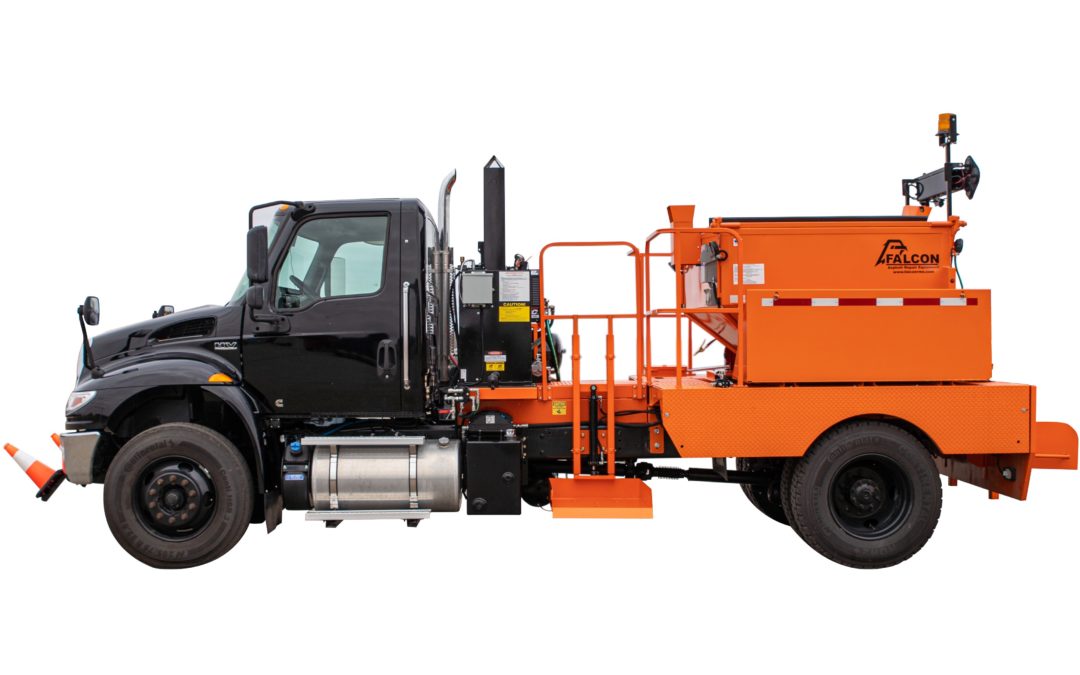Asphalt patch trucks offer a turnkey solution for repairing numerous potholes daily. However, many patch trucks on the market can suffer from a wide range of issues, such as reduced uptime, expensive repairs, and skilled labor requirements.
Read on to learn more about the five most common asphalt patch truck problems and how to avoid them.
CDL Driver Challenges
Most asphalt patch trucks utilize an auger, conveyor belt, and hydraulic system to deliver material to the ground. Those components are very heavy and give the truck a Gross Vehicle Weight Rating (GVWR) of 26,000 lbs or more. As such, state and federal laws require that a driver has a valid Commercial Driver’s License (CDL) in order to drive the patch truck.
CDL drivers are extremely challenging to come by nowadays. For starters, there aren’t many out there due in part to labor shortages—and those you do find will require a hefty salary. Therefore, using a patch truck that doesn’t require a CDL license to operate is a more practical solution that results in significant cost savings.
Reduced Availability
A standard patch truck utilizes an auger or conveyor belt powered by hydraulics to deliver asphalt to the pothole. The auger belt delivery system is not ideal for this type of work. When one of the complex mechanical components breaks, you’re looking at two to three weeks (or more, depending on part availability) of repair downtime.
Unless you have an entire fleet of patch trucks at the ready, you’ll have to put asphalt patching operations on hold until the mechanic fixes the truck. If you’re a municipality, you risk angering voters who will start lodging complaints with City Hall while your patch truck sits in the mechanic’s bay.
Increased Maintenance Requirements
Many manufacturers build complex patch truck asphalt delivery systems that require ongoing maintenance and repairs. In addition to the added downtime, if you don’t perform timely maintenance or repairs, small issues can quickly turn into major ones.
You’ll also need to perform regular truck upkeep and battery maintenance. If you’re considering purchasing a used patch truck, you’ll need to perform more frequent repairs than you would with a brand-new one. New transmissions or engine rebuilds can be quite expensive and time-consuming.
Longer ROI
Most patch trucks cost significantly more up front, as well as in the long run, than their hot box counterparts. This means it will take far longer to realize a return on your investment. If the patch truck goes down, so does your entire patching operation—which can lead to significant losses until you make the needed repairs.
How to Solve Patch Truck Problems
The Falcon patch truck solves many of the problems other patch trucks may have. The biggest advantage is that it does not require a hard-to-find CDL driver thanks to not having an auger, conveyor, or hydraulics. Instead, it uses a much lighter gravity dump to deliver asphalt material to the pothole.
Fewer moving parts mean that the Falcon patch truck weighs under 26,000 lbs GVWR—meaning anyone with a standard driver’s license can drive and operate it. Thanks to the simplicity of the gravity dump, the only upkeep requirements are to keep the battery maintained and charged.
Other benefits of the Falcon patch truck include:
Improved Productivity—Due to the innovative design, you can reasonably reduce the number of trips to repair the same pothole by a ratio of 3:1 – 5:1 or 60-80% saving in material and labor when compared to using a dump truck.
The lowered shoveling deck height of this truck will help alleviate worker fatigue, potential injuries, and worker’s compensation claims. The gravity assist feature means workers won’t have to wait upon a slow auger or conveyor belt to deliver material to the ground.
Increased Uptime—Falcon patch trucks utilize the same brand-name parts and components you’ll find on our other highly popular and reliable hot boxes. Thanks to minimal moving parts, your workers will spend more time patching and less time twiddling their thumbs as they wait for truck repairs.
Ability to Hold Material Overnight—Our patch trucks allow your workers to hold material overnight. They simply need to turn the internal temperature down to keep the material warm (180-200 degrees for hot mix) and then turn the heat back up before returning to work.
This way they don’t have to wait in long lines at the asphalt plant or sit in rush-hour morning traffic. Keeping material warm overnight will help save money and eliminate a trip to the asphalt facility to return unused material.
You can also plan future work around the ability to hold material overnight. For example, since the asphalt plants aren’t open on Sunday, workers can pick up the material on Saturday, hold it overnight at your yard, and then patch potholes on Sunday.
Reduced Maintenance—Since Falcon asphalt pothole patch trucks do not have an auger, conveyor, hydraulics, or other moving parts, they require less maintenance than a competing patch truck.
However, you will still need to perform standard truck maintenance (oil changes, etc.) and ensure that the truck’s battery is in good operating condition.
Quick ROI—Thanks to its simplicity and the fact that it doesn’t require an expensive and hard-to-find CDL driver, you’ll realize a much quicker ROI with a Falcon patch truck.
Save Time and Money With a Falcon Patch Truck
Falcon non-CDL patch trucks offer an easy and economical way of patching multiple potholes daily. You’ll save time and money while enjoying increased uptime and reduced maintenance. Click below to learn more.
See Our Asphalt Patch Truck Options


Recent Comments